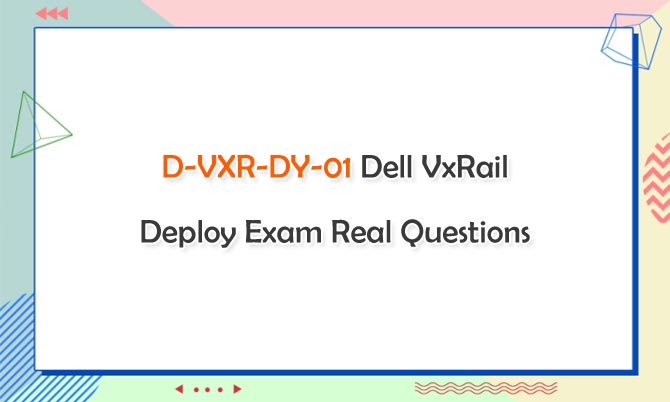To ensure successful deployment and management of these clusters, IT professionals can validate their expertise through the Dell VxRail Deploy v2 Certification, which requires passing the D-VXR-DY-01 exam. The Dell VxRail Deploy v2 Certification is designed for individuals responsible for deploying VxRail clusters. It validates the candidate's knowledge of the product, including hardware and software requirements, deployment planning, implementation, and troubleshooting. The certification process underscores the importance of having hands-on experience or completing the recommended training.

To achieve the Dell VxRail Deploy v2 Certification, candidates must:
1.Acquire a sufficient knowledge base and skill set through practical experience with VxRail products or by completing recommended training.
2.Pass the D-VXR-DY-01 Dell VxRail Deploy Exam, which comprises two parts with a combined duration of 120 minutes. Candidates must achieve a passing score in both parts to obtain the certification.
The D-VXR-DY-01 exam evaluates a candidate's proficiency in various aspects of VxRail deployment. The topics covered ensure a comprehensive understanding of both theoretical and practical components necessary for successful implementation. Here's a breakdown of the topics and their respective weightage:
VxRail Physical Components (4%)
VxRail Cluster Architecture: Understanding the design and layout of VxRail clusters.
Rack Requirements: Knowledge of the physical space and power requirements for VxRail systems.
VxRail Deployment Planning (12%)
vCenter Server: Insights into vCenter server functionalities and configurations.
Networking Components: Familiarity with physical networking elements and vSphere Distributed Switch usage.
DNS Options: Configurations and implications of DNS in VxRail deployments.
Node Discovery and vSAN Options: Methods for node discovery and configuring vSAN options.
Using VxRail Configuration Tools (4%)
Creating Projects and Configurations: Utilizing the VxRail Configuration Portal for project setup.
Reviewing Configurations: Ensuring readiness for implementation through thorough configuration review.
VxRail Hardware Installation and Initialization (8%)
Installation Procedures: Steps for installing and cabling VxRail cluster hardware.
Configuring iDRAC and System Time: Initial setup for remote management and system synchronization.
VxRail Network Environment Requirements and Initialization (8%)
Network Settings Configuration: Setting up the network parameters for VxRail.
Manual Network Validation: Ensuring the network environment meets deployment standards.
Deploying the VxRail Cluster (24%)
Initialization Processes: Executing VxRail initialization with managed and customer-managed vCenter Servers, including vSAN ESA.
VxRail Post-Deployment Procedures (18%)
Post-Installation Validation: Confirming the VxRail cluster is functioning correctly post-deployment.
Configuring vSAN Settings: Adjusting vSAN settings to optimize performance.
Setting Up Native Backups: Implementing backup solutions for data protection.
VxRail Cluster Upgrade and Expansion (10%)
Upgrade Requirements and Activities: Understanding the necessary steps and best practices for VxRail upgrades.
Scale-Out Best Practices: Expanding the cluster efficiently to meet growing demands.
VxRail Troubleshooting (6%)
Log Collections and Troubleshooting: Gathering logs and using troubleshooting tools to resolve issues.
VxRail REST API (6%)
REST API Functionality: Utilizing REST APIs to perform various tasks within VxRail environments.
In-Depth Hands-On Experience: It's essential to gain practical experience with VxRail systems. This helps not only in understanding the theoretical concepts but also in how these systems can be deployed and utilized in real-world applications. The more you practice, the more familiar you will become with the various aspects of VxRail systems.
Comprehensive Training Courses: Make it a point to enroll in the recommended training programs. These courses are designed to cover all the exam topics thoroughly and provide a deep understanding of each concept. They can also help in clearing any doubts and strengthen your foundation of the subject.
Use of Real Exam Questions: It's highly beneficial to utilize the official D-VXR-DY-01 real exam questions. This can serve as an effective tool to test your knowledge and identify areas that need more focus. Regularly practicing these questions can help in improving your problem-solving speed and accuracy.
Active Participation in Study Groups: Engage with peers or online communities by joining study groups. This allows you to discuss concepts, clarify doubts, and share insights. Interaction in such groups can provide different perspectives, and the shared learning can significantly enhance your understanding of complex topics.
The Dell VxRail Deploy v2 Certification, anchored by the D-VXR-DY-01 exam, is an essential credential for IT professionals aiming to master VxRail deployments. By covering a wide range of topics from physical components to REST API functionalities, this certification ensures that candidates are well-equipped to handle the complexities of deploying and managing VxRail clusters, ultimately contributing to more efficient and cost-effective IT operations.